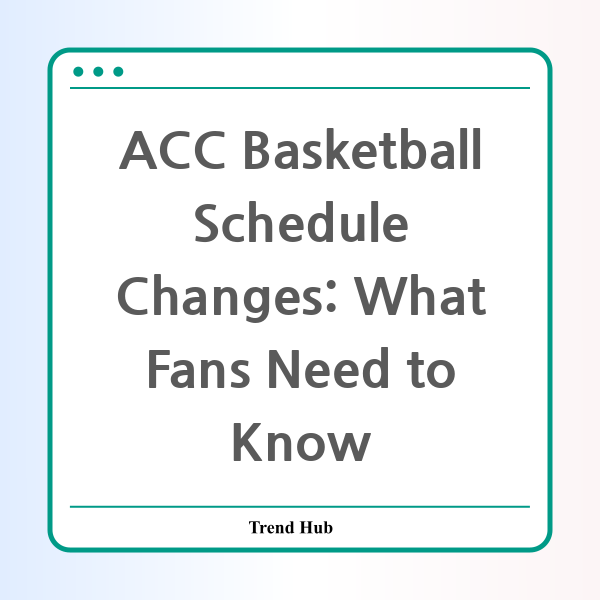* This website participates in the Amazon Affiliate Program and earns from qualifying purchases.

Are you ready for a shake-up in the ACC basketball landscape? As the Atlantic Coast Conference (ACC) prepares for a significant shift in its men's basketball scheduling, fans are buzzing with excitement and curiosity. The ACC has announced a return to an 18-game conference schedule starting from the 2025-26 season, moving away from the previously adopted 20-game format that had been in place since the 2019-20 season. This decision comes after the conference experienced some disappointing results in the NCAA Tournament, with only four out of 18 teams making the cut in the last season.
This move reflects a strategic effort by the ACC to enhance their teams' chances of securing more at-large bids for the NCAA Tournament. The league's performance in recent tournaments has raised eyebrows, prompting athletic directors to reconsider their scheduling approach. The ACC's decision indicates a more tactical mind toward balancing out-of-conference and conference games, which is vital for improving overall tournament prospects.
The Rationale Behind the Change
The ACC’s choice to revert to an 18-game schedule is rooted in a desire to create a more competitive environment. With past decisions leading to several teams facing off against weaker opponents, it became clear that the number of less competitive games was negatively impacting the conference’s tournament bids. By reducing the number of conference games, teams can focus on scheduling more meaningful out-of-league matchups that enhance their resumes.
Last season, the ACC reported the lowest percentage of teams sent to the NCAA Tournament since the tournament expanded to 64 teams in 1985—only 22.2%. This has understandably alarmed conference leaders, spurring the shift back to the 18-game schedule. As stated by ACC Commissioner Jim Phillips, this decision aims to provide a better balance of non-conference and conference games, potentially making the league more competitive.
New Scheduling Structure: What to Expect
The revamped scheduling will involve two home-and-home series, 14 single-game matchups, and one zero-play. Each team will play 16 opponents each season rather than 17. Here’s a breakdown of what fans can expect:
- Permanent Rivalries: Teams will continue to play against their designated rivals home and away. For UNC, this is Duke; for NC State, it’s Wake Forest.
- Variable Rivals: Each year, a second opponent will be selected for home-and-away games based on matchups that could influence NCAA Tournament prospects.
- Single Games: Teams will play seven opponents at home and seven on the road, with one team missed each year.
This new structure is expected to create more engaging matchups, enhancing rivalries while giving coaches and teams the flexibility to curate a stronger non-conference schedule.
The Impact on Iconic Rivalries
One of the most significant shifts fans are concerned about is the fate of the historic rivalry between North Carolina and NC State. As it stands, there is no guarantee that these two teams will meet twice every season under the new scheduling format. While the potential exists for them to still face off annually, it's crucial to recognize that changes in scheduling strategies may impact how often these classic matchups occur.
The absence of consistent matchups may change the dynamics of their rivalry, but it also could allow for other intriguing contests to emerge, offering fans fresh narratives and exciting games to look forward to.
Conclusion: A New Era for ACC Basketball
The ACC's decision to revert to an 18-game schedule marks a pivotal moment in collegiate basketball. With the implementation of these changes, the conference is not only addressing past shortcomings but also embracing the future of college basketball competitiveness. Fans can look forward to seeing how these adjustments will play out across the league, leading to a more vibrant and competitive atmosphere in ACC basketball.
As we approach the 2025-26 season, it will be fascinating to see how these shifts impact team performance and fan engagement. Will the return to an 18-game schedule boost the ACC's presence in the NCAA Tournament? Only time will tell, but one thing’s for sure: the landscape of ACC basketball is about to get a whole lot more interesting.
* This website participates in the Amazon Affiliate Program and earns from qualifying purchases.